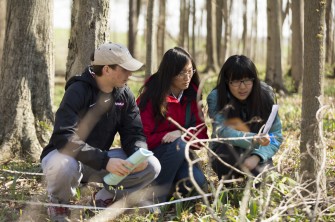
Nature Preserves
The Kraus preserve is 80 acres and the Bohannan preserve is 54 acres. Students and faculty use them as outdoor labs and for research.

Explore the connections across the diverse scientific fields to better understand some of the most important environmental issues facing scientists and society today. Strengthen your scientific skills with hands-on research projects, internships, and travel-learning courses.
Environmental Science at Ohio Wesleyan is an interdisciplinary, natural science approach to the environment within the context of the liberal arts. Diverse courses provide you with an integrative, scientific understanding of the environment with an emphasis on approaches to addressing current environmental challenges.
Once you've taken your core classes, you can explore the environment through upper-level natural science courses in a wide range of disciplines. Every major will complete a capstone project. You will be prepared for graduate studies in science or to find a job right after graduation.
Undergraduate research, performed under the mentorship of expert faculty, is a central component of The OWU Connection.
We emphasize intellectual curiosity, creativity, initiative, and synthesis, and all Environmental Science majors are encouraged to participate in mentored research projects or internships.
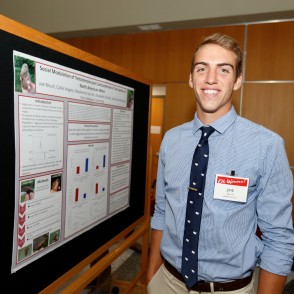
Joe Brush '20 participated in the Summer Science Research program, where he studied aggression in two different male songbird species with Drs. Dustin Reichard and Elizabeth Schultz.
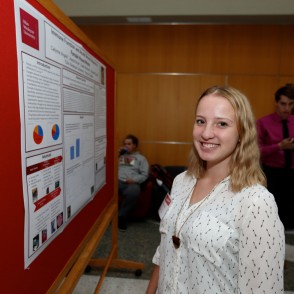
Callie Angelo '20 participated in the Summer Science Research Program, where she studied immune responses of nesting House Wrens with a limited energy supply.
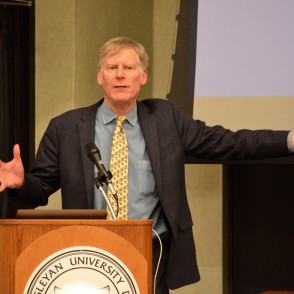
Jonathan Overpeck, a 2007 Nobel Prize winner, visited OWU to discuss global climate change for the 2019 Eddy Lecture on World Politics.
Travel-Learning Courses combine classroom study with travel to areas of the world where you may study the issues discussed in class in the settings where those events are occurring. Recent Travel-Learning Courses have explored environmental topics in Brazil, Costa Rica, and the Galapagos Islands.
Theory-to-Practice Grants give students the opportunity to research environmental topics in the field anywhere in the world.
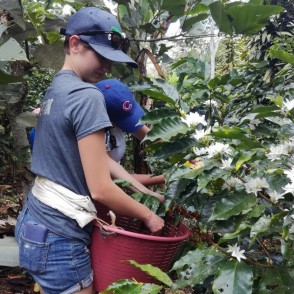
Ashley McCracken '19 studied sustainability in local industries while on a Travel-Learning Course to Costa Rica in Winter 2017.
Build your experience and connections to the professional world with internships and research projects at environmental organizations and other universities.
Environmental Science students also can apply for University-funded OWU Connection Grants for research projects around the world.
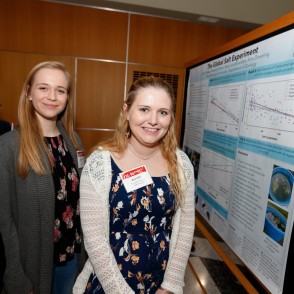
Rebecca Poter '20 (left) and Katie Vonderembse '19 (right), along with Colin Hawes (not pictured) participated in the 2018 Summer Science Research Program with Dr. Amy Downing. They researched the effects of de-icing road salts on bodies of water with high quantities of microscopic organisms.
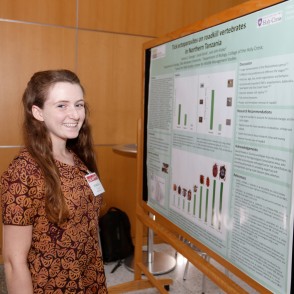
Serena George '19 spent a semester researching ectoparasites found on ticks in Northern Tanzania. She conducted her research as part of a project at the School for Field Studies Center for Wildlife Management Studies, where she studied abroad. Her research helps show what tick-borne diseases people living in Northern Tanzania may be at risk for.
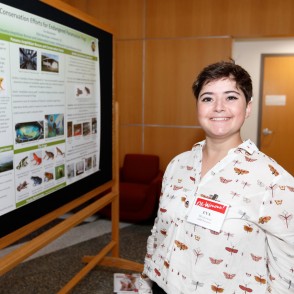
Eva Blockstein '19 spent eight weeks volunteering at the Panama Amphibian Rescue and Conservation Center, where she studied spindly leg syndrome in endangered frog species with Brian Gratwicke, Ph.D. Her research was funded by an OWU Theory-to-Practice Grant.
OWU faculty are outstanding scholars and researchers—and passionate teachers. They will push you, challenge you, inspire you, and work with you on your own research and creative projects.
They can even pack a 3-minute lecture with ideas, insight, and imagination. Check out our unique I³ lectures.

The Kraus preserve is 80 acres and the Bohannan preserve is 54 acres. Students and faculty use them as outdoor labs and for research.
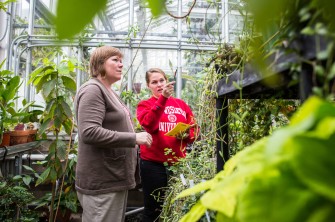
OWU’s greenhouse has tropical and desert rooms available for students. The greenhouse is used for teaching classes, and you can use it for independent research.
You can apply to participate in the Summer Science Program where you research with fellow students and faculty for 10 weeks. You then present your research at the Patricia Belt Conrades Summer Science Research Symposium in the fall.
In a unique "conversations" class, graduating seniors serve as mentors to all new Environmental Science majors. They help guide new students to shape their plans for future work in their major.
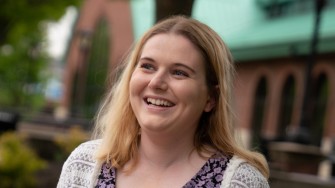
After graduating, Katie was accepted into the Environmental Science program at Miami University. While at OWU, Katie conducted research on the effects of run-off on freshwater ecosystems and studied abroad in Sweden.
In the past few years, OWU graduating seniors have moved on to environment-related jobs at American Environmental Group, Audubon Zoo, Columbus Zoo & Aquarium, Coyote Trails School of Nature, and Resource One.
Environmental Science graduates often continue their studies in graduate school. Recent OWU science graduates have studied at Arizona State, Boston University, Dartmouth, Duke, Ohio State, Penn State, University of California Davis, Yale, and more.
After graduation, Sarah Jilbert '14 earned an MBA from Duquesne University focused on Environmental Sustainability. She now works as a Sustainability Analyst for DHL Supply Chain in Westerville, Ohio.
Rebecca Heisman '09 earned an MS in Environmental Education and Interpretation from University of Wisconsin-Stevens Point. She now works as an Environmental Writer and Communications Specialist in Walla Walla, Washington.
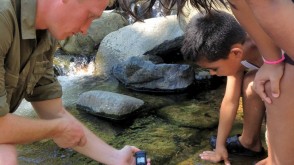
Michael Durfee '17 performs water quality research.
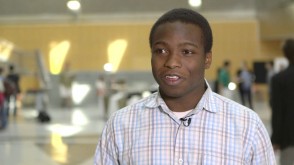
Jordan Brown '18 discusses research he performed as a first-year OWU student.
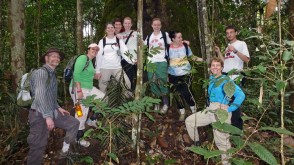
Travel-Learning Course on the rain forest environment.
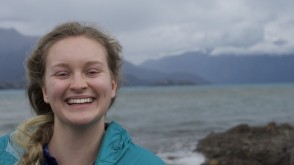
Olivia Lease '17 studied preservation and privatization of nature in Patagonia with a Theory-to-Practice Grant. She currently works for Americorps in Florida.
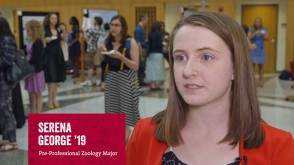
Serena George '19 describes her research on the basilisk from a Travel-Learning Course.
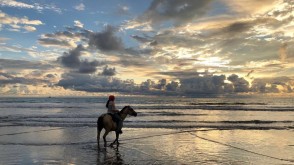
Students on Dr. Amador-Rowley's Environmental Alterations Travel-Learning Course end the day horseback riding on a beach.
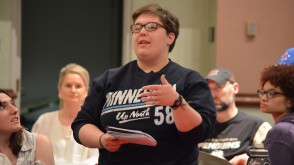
Environmental Science student Kait Aromy '20 asks Nobel Prize winner Jonathan Overpeck a question during the 2019 Eddy Lecture on World Politics.
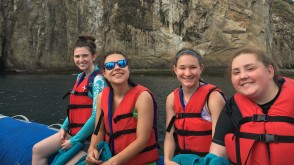
Students on Dr. Panhuis's Travel-Learning Course to the Galapagos Islands explored where Charles Darwin did research for his 'Origins of the Species.'
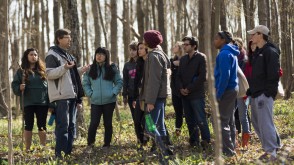
Dr. David Johnson leads a class at one of OWU's nature preserves.